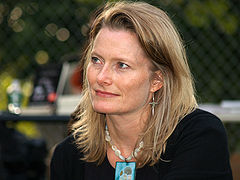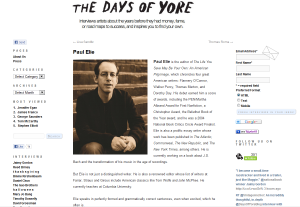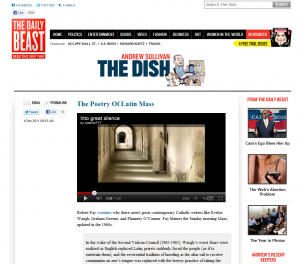There are times when I’ve found myself skimming through The Paris Review interviews and hoping the interviewer would stop being profound and ask the writers more pedestrian questions about their early writing life: How did you make a living in the beginning? What was your writing routine? How did you write every day and make time for your spouse, kids, etc.? Did you ever have to have a full-time office job?
Now there is a website with writer interviews, The Days Of Yore, that asks the practical questions all writers are obsessed with, including some that are simply fun and superfluous, such as what novelist Jennifer Egan ate in the lean years (apparently “a huge cup of coffee and a corn muffin every morning” from a NYC diner).

The editors, in their own words, write that the mission of The Days of Yore is to focus on that part of an artist’s life (they do not focus exclusively on writers) that delves into the…
“…floating, in-between time when we’re figuring out how to establish and sustain ourselves (and make money) doing what we want to be doing.”
From the perspective of a struggling writer, the interviews reveal how some successful writers have confronted the age-old challenge of creating art amidst the demands of every-day life.
Jennifer Egan, author of A Visit From The Goon Squad, says she worked as a private secretary for a time, which allowed her to write from 8 am to 12pm each day:
“I became a private secretary for this woman, the Countess of Romanones. She had been a spy during WWII…She now had a HUGE contract to write two more books and, you know, her life was spiraling out of control, so I was her private secretary. I worked from 1-6 only and she paid enough to live on. She was very difficult to work for, but I had from 8-noon to write.”
Read the full interview with Jennifer Egan.
Paul Elie is the author of the book on American Catholic writers The Life You Save May Be Your Own: An American Pilgrimage. He also has a day job (a rather nice one) as an editor at Farrar, Straus and Giroux. He spoke about working on his own writing while working as a full-time editor:
“It’s a strain for me to ‘be a writer’ from 10 p.m to midnight after a long day at work and with children, which is what I do most days now. But what makes it possible is that my writing is mine. Those two hours are the part of the day when I’m not working for anybody.”
Read the full interview with Paul Elie.
George Saunders is the author of the short story collection CivilWarLand in Bad Decline. He worked for years as an environmental engineer and actually welcomed the stability of a full-time job: “I found that I was much more comfortable being a corporate guy, with a steady income, who pushed the rules a bit, than I was being a sort of beatnik, not working, with two kids at home.”
As for his advice to young writers trying to make a living nowadays:
“I think the only defensible position is to sort of say to hell with making a living and put all your energy into making something new, that seems beautiful to you – that is, to try your best to push your work into a new/iconic place and let the chips fall where they may.”
Read the full interview with George Saunders.

